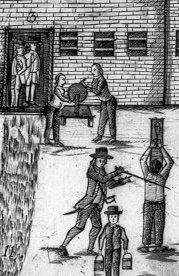1776: FROM PENAL COLONY TO GOLDEN LAND
In 1776 the American people took control of their lives and environment and stopped being the dumping ground of the Britain's refuse, convicts (white slaves). For that was what the colonies were occasionally before 1718 and systematically between 1718 and 1776. The estimated number of British convicts sent to America range between 50,000 to 120,000. For years, thereafter, the British government made efforts to renew the dumping but, ultimately, the Americans stood firm. So, Australia was born. It received an estimated 160,000 convicts.
If you were unaware that the British America used to be a penal colony, it is because the American elite,starting with Jefferson, have done their utmost to cover it up. America needed immigrants but it was difficult to market a place whose name was designed to send shivers down prospective criminals backs. Before America could become the destination of the bold and the ambitious yearning to be free, it had to stop being the British Devil's island. In Emigrants in Chains, Peter Wilson Coldham, quotes contemporary philosopher, Jeremy Bentham:
Among the advantages the North Americans have gained from their independence, there is one which cannot fail to strike every man who has any feeling of national pride; it has saved them from the humiliating obligation of receiving each year an importation of the refuse of the British population; of serving as an outlet for the prisons of the mother country, whereby the morals of their rising people were exposed to injury by a mixture of all possible kind of depravity.North America, having exposed to this scrouge for upward of a century, no longer serves as a receptacle for these living nuisances.
Bentham goes on and asks:
But can any limit be assigned to the moral effects that may have been produced by this early inoculation of vice?
He expresses his doubts that such is possible but, then, goes to speculate about the reformative aspects of the country:
There are two circumstances highly conducive to the reformation of the convicts transported (to America.) Their admission into families composed of men of thrift and probity; their separation from each other. When a master in America had engaged a convict in his service, all the members of the family became interested in watching his behavior (and) he had neither the inducement nor the means of giving loose to his vicious propensities . . .
Perhaps so, in any case following an exhaustive archival study of the fate of the convict in the Chesapeake, a region which received an especially large number of convicts, Roger Ekirch concludes:
Contrary to prevailing fears, coffers were not emptied and throats were not slashed - not, at least, by many transported felons. Men and women, who in numerous cases bore long and chequered pasts, followed a different course in the American wilderness.
Of course, it is difficult to say what the impact of continued convict importation would have been on the development of these United States. At some point, quantity becomes quality. One thing is clear, following 1776 White Americans no longer arrived here in chains. Unfortunately, black Americans continued to do so for another thirty years or so. But, then, they were not criminals, merely defeated tribe members. In other words, America was a penal colony no more. Instead, it was on its way to becoming"The Goldene Medina," or the Golden land, where millions have eagerly come to build and be rebuilt.
Neil Diamond - They come to America:
Far,
We've been traveling far
Without a home
But not without a starFree,
Only want to be free
We huddle close
Hang on to a dreamOn the boats and on the planes
They're coming to America
Never looking back again,
They're coming to America - HomeDon't it seem so far away
Oh, we're traveling light today
In the eye of the storm
In the eye of the storm - HomeTo a new and a shiny place
Make our bed and we'll say our grace
Freedom's light burning warm
Freedom's light burning warmEverywhere around the world
They're coming to America
Ev'ry time that flag's unfurled
They're coming to AmericaGot a dream to take them there
They're coming to America
Got a dream they've come to share
They're coming to AmericaStand up for America
Stand up for America
Stand up for America
Stand up for AmericaToday - yes
Today - yes
Today - yes
Today - yes (today)My country 'tis of thee (today)
Sweet land of liberty (today)
Of thee I sing (today)
Of thee I sing
Today, Today, Today
Today, today, today

